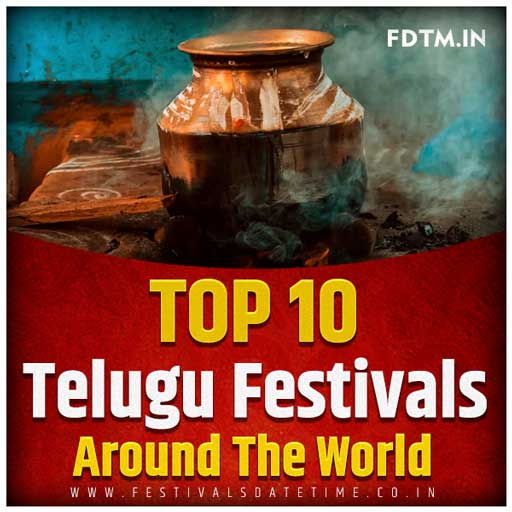We have so far talked about various philosophies and beliefs in Hinduism and rituals that place man at the center of everything and promote personal development and growth.
Top 10 Famous Telugu Festivals
1. Chitrirai festival
According to Hindu mythology, Lord Kallajhaga (incarnation of Vishnu) came here on a golden horse for the wedding of his sister Meenakshi and Lord Sundareshwar.
It is said that Lord Shiva came to Madurai as Sundareshwar with his ganas to marry Meenakshi Devi.
There are many religious rites in this festival, including the coronation of Goddess Meenakshi, the chariot festival, and the marriage of the gods.
This festival ends with the incarnation of Lord Vishnu, Lord Kallajhaga, being brought back to the temple.
2. Mahamaham Festival
Millions of devotees are flocking to the Mahamagam Pool for the holy bath as the Tirthwari ceremony is being held today. Thus maximum security arrangements have been made there.
Mahamagam festival is celebrated once in 12 years in Kumbakonam, Tanjore district. When Guru is in Simmarasi, the day on which the full moon with the star Magam comes is called Mahamagam.
On this day people consider it a great privilege to take a holy bath in the Mahamaka pool.
3. Vinayak Chaturthi
Ganesha Chaturthi is considered a festival celebrated all over India. On this day, it is customary for friends and brothers to come together to buy Ganesha made of clay and worship it at home or in a commonplace. In this, it is customary to create Ganesha’s favorite arugambul, pudding, chundal, etc.
It is also worth mentioning that the banana tree and the mango leaf pooja are considered to be a regular part of the worship of Ganesha. Worship and bless Ganesha, the first God of all, to live with luck and wealth.
4. Navratri
Navratri fasting is one of the most important fasts to observe and worship in the form of Mother Shakti. Navratri fasting is observed in honor of the power of the Mother Goddess.
Navratri is usually celebrated nine days after the Mahalaya Amavasya, the new moon day that falls in the month of Purattasi.
5. Pongal Festival
The ancestral festival of Pongal is called Thainneeradal. During the Sangam period, the river and the pond water are warm at dawn in the month of January.
The evening will be cool. Sangakkala women enjoyed bathing in this warmth in the morning. The literature refers to this as hydration.
Taib Pongal is the worship of giving thanks to all those who have helped to produce the rice we eat. Freshly harvested paddy is harvested and turned into rice; Pongal is a time of thanksgiving to the goddess of nature, the sun, the cow, and all that helped.
6. Natyanjali Dance Festival
The Natyanjali Festival was started in 1981 on behalf of the Natyanjali Foundation at the Chidambaram Natarajar Temple. The foundation has been conducting the Natyanjali festival at the temple for 33 years till 2014.
According to the secretary of the foundation, 50 dance performances will be held during the five-day Natyanjali festival from the 19th to the 23rd.
There are 6 dance dramas, Mohini dance, Kathak, Kuchipudi, and Manipuri dance. Dancers from various parts of Tamil Nadu, northern states, and foreign countries including the USA, Singapore, and Russia are participating.
7. Karthigai Deepam
Karthika Thirunal is celebrated in a very special way in Thiruvannamalai. Thiruvannamalai is one of the hotspots of famine.
On the day of Karthika, the houses of Tamil Nadu are decorated with lights. The lamp is everywhere. The light of the lamp will dispel the outer darkness.
The memory of Eisen will dispel the inner darkness. On the evening of Karthika, saffron is placed on the lanterns, oil is poured on them, and a candle made of panchalo or triyalo is worshiped, and the lamp is mounted on the roofs, windows, and doors of the house.
The decorative lights are a sight to behold. This festival of lights is celebrated for 3 days.
8. Jallikutta Bull Festival
Jallikkattu is held in various parts of southern Tamil Nadu, Jallikkattu is world-famous in Alankanallur, Avanyapuram, and Palamedu in the Madurai district.
With this year’s Pongal festival set to be celebrated tomorrow, preparations for these heroic games have been made well. The competition is conducted with corona term guidelines.
The bulls participating in Jallikkat have been specially trained and prepared for it. Similarly, the warriors who are preparing to tame the bulls are specially trained.
9. Deepavali
Deepavali is celebrated all over the country on the day Rama returns to Ayodhya with his wife Sita and brother Lakshman after killing fourteen years of exile.
Deepavali is celebrated as the Hindu New Year in northern India. Deepavali is a popular day for Mahalakshmi.
We welcome Mahalakshmi who cleans houses and gives wealth before Deepavali in the hope that Lakshmi will come into a clean house. Merchants worship Ganesha on this day and start a new account.
In the state of Odisha, it is customary to worship the ancestors who died on Diwali. Kali Puja is held in West Bengal on the eve of Diwali.
10. Saraswathi Pooja
Although many festivals are celebrated in the country, Ayutha Puja is celebrated as the main festival of worshiping the equipment used by our industry and work.
The profession of making is called a deity. In that sense, the ninth day of Navratri is celebrated as Saraswati Puja and Ayutha Puja.
The day we worship weapons to kill Mahisha is celebrated every year as Ayutha Puja and Saraswati Puja.
Just as Mahisha worshiped weapons to kill his mother, we, too, are celebrating critically in order to worship the tools we use for our daily tasks.
Following this, we will talk about ‘Hindu festivals’ in this section. Some may wonder if it is necessary to talk about festivals. We often take it for granted that festivals are celebrated and do not pay enough attention to them.









